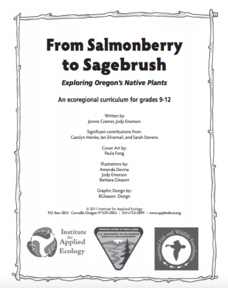Captain Planet Foundation
Which Plant Is Which?
Learn about dichotomous keys, plant identification, and how to care for the planet with a lesson plan that includes several hands-on and innovative activities. Kids go on a plant scavenger hunt and classify the plants that they find...
Chicago Botanic Garden
Preparing for Project BudBurst
Adopt a plant and get to know its phenophases. The third instructional activity in a six-part series combines plant identification and phenology. Pupils begin by creating their own field guides to learn about the features and...
National Wildlife Federation
Tree Detectives!
Trees may look pretty similar until you take a closer look. Young scientists use their observation skills to describe the difference between the bark, leaves, and seeds of different trees. They then use a field guide to identify local...
Cornell University
Field Day: Be an IPM Detective
Become a pest detective! Individually or in small groups, scholars scout the land to discover which pests—plant and animal—inhabit it, determine whether the pests are endangering the environment, and summarize their findings.
Cornell University
Weed IPM
Go on a weed hunt! Scholars gain insight into the characteristics of plants and examine the outdoor environment in order to identify five different types of weeds. Learners then show what they know with a one-page reflection.
Cornell University
What is IPM?
Discover what a pest is and how to identify one with a lesson that looks closely at our outside world and taxonomy. Scholars investigate insects and plants to practice their identification skills, take a survey, and explore the...
Science Education Resource Center
Compare and Contrast deciduous and evergreen tree leaves to aid in tree identification
Boost observational skills and get to know the difference between deciduous, coniferous, and evergreen trees with a lesson that challenges scholars to compare, contrast, identify, sort, and draw their findings.
Chicago Botanic Garden
Preparing for Project BudBurst
Plants take cues from the environment—change in daylight hours and temperature—to complete their seasonal life cycles. Lesson four in the series of six has classes collect phenology data on plants. After taking initial observations,...
Allegany-Limestone Central School
Plantae WebQuest
Send your young life scientists on a plant webquest that has them reading case studies to decide if seeds are seeds and plants are plants.
Chicago Botanic Garden
Preparing for Project BudBurst
Male deer growing antlers to begin the breeding season is an example of a phenological event. First in a four-part series is an activity requiring individuals to collect phenological data on their campus. Classes discuss phenology, the...
Institute for Applied Ecology
From Salmonberry to Sagebrush - Exploring Oregon’s Native Plants
Take a deep dive into Oregon's ecosystems, plants, and changes from the past to the future. Many hands-on activities in an environmental science unit delight scholars, including creating a field guide for a local park. The in-depth study...
Curated OER
Plant Biology
Young biologists discuss the reasons behind the current use of the plant identification system. They get into groups and identify the characteristics of each species of plant which is described. The keys needed for groups to make...
Curated OER
Bird Ecology Unit
Birds, plants, and vegetation, is there anything more lovely? There is! Engage your class in the scientific process, data collection, and data analysis. They stroll their campus observing and identifying various birds and plants,...
Curated OER
Name that plant!
What is a dichotomous key? When your kids ask, hand them a learning exercise like this one, to explain it. They use the key to identify four different trees, based on the budding twigs they've produced. Tip: Have learners extend this...
Curated OER
Guidebook
Students create a guidebook page about a plant on the school grounds. In this life and plant science lesson, students identify plants around the school, then research the plant and write a narrative about it. Students publish the book...
Curated OER
Ecology of The Sonoran Desert Soil Crusts: Biology, Geology
This lesson is designed after research done on the ecology of soil lichen in the Tucson Basin area during the summers of 1997 and 1998. Its purpose is to guide students into adopting the problem solving thinking of ecologists. The lesson...
Curated OER
Build a 3-d Plant Model
Third graders construct a three-dimensional model of a flowering plant. They examine the major plant parts and their basic functions. They demonstrate an understanding of the similarities and differences in the physical...
Curated OER
2005 Grade 8 Science Released Test Questions
Here is a collection of 22 multiple-choice questions on topics from the physical and life sciences. Apparently they came from an 8th grade comprehensive science exam and have been released for public use. They may serve as a sufficient...
Curated OER
Plant Hunt
Students explore botany by conducting field research outside of class. In this plant species lesson, students examine a nearby park or beach in which they can dig and search for plants they aren't familiar with. Students collect many...
Curated OER
Botany Basics
Students survey plants. In this plant identification instructional activity, students explore the difference in plants to aid identification. Students determine which plants may be used for medicinal reasons.
Curated OER
Schoolyard Jungle: What's Out There?
Eighth graders create a plant study guide using their outdoor classroom environment. In this ecology instructional activity, 8th graders take photographs of plants they collect from the outdoor classroom and create plant field...
Curated OER
Word Search: Common Seashore Plants
In this science worksheet, students find the names of 15 plant species common to the seashore in a word search puzzle. The word bank has detailed color drawings of each plant.
Curated OER
Who Am I? (Plant Identification)
In this science worksheet, young scholars study 16 detailed color pictures of plant species. Students identify each plant. There is no space to write the name of the plant and it is assumed this is done orally. Answers are provided...
Curated OER
Who Am I?
For this science worksheet, 5th graders will identify 16 different plants. Students will focus on the pictures provided and label each plant by name.

























